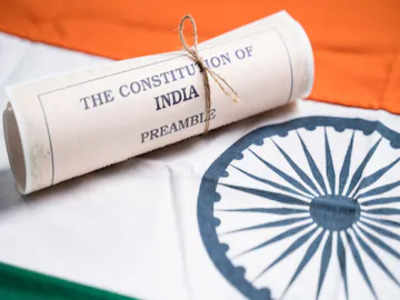
The Constitution of India is a grand vision statement for an egalitarian society. On November 26, 1949, the Constitution was enacted, adopted and given to us. Therefore, each year, our country commemorates November 26 as the Constitution Day to honour the visionary framers of the Indian Constitution. One of the most remarkable aspects of the Indian Constitution is its ability to balance a strong central government with the autonomy of states. This federal structure ensures that while we remain united as a nation, the diverse regional needs and identities are respected and preserved. The Constitution also enshrines fundamental rights that protect our freedom and dignity, reminding us of the values we hold dear. These rights are complemented by fundamental duties, which underscore our responsibilities as citizens.
The Directive Principles of State Policy, though non-justiciable (that which is not capable of being decided by a court of law or by legal principles), serve as a moral compass for the state, guiding the policies aimed at social and economic welfare. This salutary inclusion ensures that the state remains committed to creating a just society, even as it navigates the complexities of governance.
Stable framework
The Indian Constitution has played a crucial role in shaping modern India. It has provided a stable framework for governance, facilitated social justice, and promoted economic development. As we celebrate 75th Constitution Day, there is a need to reflect upon the major amendments incorporated in the Constitution of India to meet changing socio-politico needs of ‘We the People’.
The Constitution (First Amendment Act) 1951 inter alia restricted free speech by adding additional grounds under Article 19(2) and added the Ninth Schedule, thereby limiting the power of judicial review. Though the Supreme Court of India in IR Coelho v. State of Tamil Nadu (2007) held that laws placed in the Ninth schedule would be unconstitutional if they violate the Basic Structure of the Constitution of India. The theory of basic structure as propounded by the Apex court in Kesavanand Bharti vs State of Kerala (1973) has been applauded by majority of the scholars but has also found critical reviews that this doctrine is limiting the constitutional amendment powers of the Parliament which reflects the will of the people, thereby, circumventing the powers of the parliament.
The Constitution of India under Article 19(1) (f) provided for the fundamental right to acquire, hold and dispose of property, however, the Constitution (Forty-fourth) Amendment Act, 1978 omitted this fundamental right and it was consigned to being the Constitutional right, consequently, the right of the citizens to move the Supreme Court to enforce right to property was curtailed. The right to property has been the subject of intense debate and in the light of the Apex Court judgment in Property Owners Association & Ors. versus State of Maharashtra & Ors. (November 2024) holding that the material resources under Article 39(b) does not include all private property, there is need to restore the right to property as was originally enshrined under the Article 19(1)(f). The trilogy of right to life, liberty and property are sacrosanct and the Constitution of the United States of America under the Fourteenth Amendment (1868) also provides for these rights, by stating inter alia ‘nor shall any State deprive any person of life, liberty, or property, without due process of law…’.
These developments reflect the dynamic and transformative nature of Indian constitutional jurisprudence. It embodies the aspirations of our forefathers and provides a guiding light for our nation’s progress. The Indian Constitution is more than a legal document; it is the cornerstone of India’s democratic ethos as a living document.
Core values
Celebrating the constitutional values, School of Law, Bennett University is commemorating their flagship event Constitution week 3.0 from November 22-26, 2024, and Justice Rajesh Bindal, judge, Supreme Court of India, has consented to deliver the chief guest’s address. As a part of the celebrations, an international conference on ‘Discourse in Comparative Constitutional Law: Contemporary Trends and Challenges’ along with many different competitions and activities have been organised. The programme will be graced by the presence of eminent legal luminaries to celebrate the ever-living spirit of the constitution.
For more information, visit
(The authors are dean, School of Law, and assistant professor, School of Law, Bennett University, Greater Noida, respectively)

